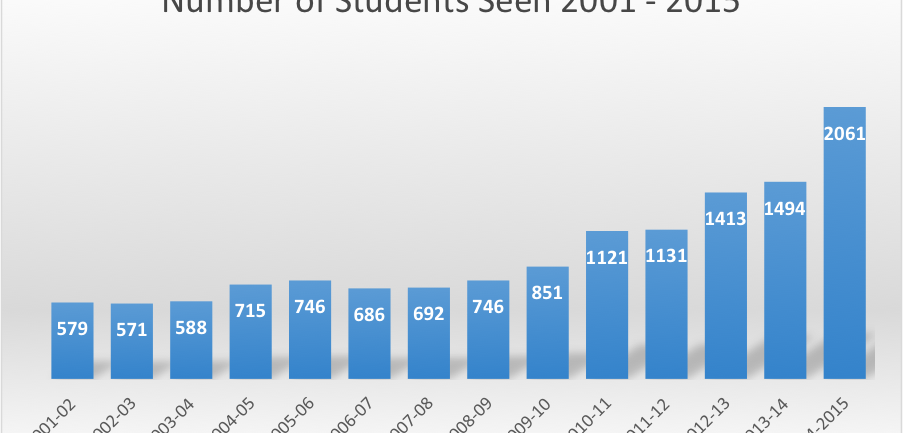Cardiff UniversityÔÇÖs Student Support Centre has been described as being ÔÇ£overwhelmedÔÇØ by a number of students requesting access to their services.
Gair Rhydd have received reports of students having counselling sessions moved from weekly to fortnightly, as well as lengthy waits for appointments with both the Counselling Team and the Wellbeing Team.
The Student Support Centre is located at 50 Park Place, and offers, in the words of a University spokesperson, ÔÇ£counselling, health and wellbeing services to help you get the best degree you can and make the most of your time at universityÔÇØ.
According to a University spokesperson, although the services have seen an increase in demand, Student Support has continued to ÔÇ£innovateÔÇØ to cope with the pressure and has introduced a wide range of alternative methods of receiving help.
ÔÇ£They are not there to replace NHS provision for long term mental health conditions which might take a lot longer to resolveÔÇØ they stressed.
Despite this, Gair Rhydd spoke to students about their experiences with the Student Support Centre. One 2nd year, who wished to remain anonymous, said: ÔÇ£I have been receiving counselling every week to help manage my anxiety but due to high demand from students, my sessions had to be put to fortnightly which can sometimes make my anxiety worseÔÇØ.
Another 2nd year student, who also requested to remain anonymous, reaffirmed the issues surrounding waiting time for appointments: ÔÇ£I have suffered badly with anxiety and depression…I have just re-enrolled and have an appointment coming up. There is a real problem with the amount of time it takes to access support and help. I have to say once accessed the help is really goodÔÇØ.
During an interview with Gair Rhydd during Election Week, Student Disabilities Officer candidate George Watkins described Student Support as being ÔÇ£overwhelmedÔÇØ due to high demand, explaining that whilst he was attending a drop-in session, ÔÇ£they had to turn away five or six different peopleÔÇØ.
Watkins highlighted the severity of this problem, stating: ÔÇ£If someoneÔÇÖs having a bad day then thatÔÇÖs the last thing they need to be toldÔÇØ.
In response to the allegations, the University spokesperson said: ÔÇ£In common with other universities we are seeing demand for professionally delivered services to support students increaseÔÇØ.
This number of students seeking support has increased sharply in recent years, reaching a record high of 2,061 students in the 2014-15 academic year. This is up from 1,494 students the previous year, while numbers have nearly doubled since 2011-12, when 1,131 students engaged with the service.
This rise has put increased pressure on support services, and has prompted the Student Support Centre appoint additional staff, and also to consider expanding their current facility. The spokesperson continued: ÔÇ£There has been some increase in staffing and we are in the process of increasing the number of sessional (hourly) staff we can call on.
ÔÇ£The major operational constraint is the availability of rooms to see students in the existing Student Support Centre which the service has outgrown. The University is developing plans to resolve thisÔÇØ.
Asked about plans for expansion, they continued: ÔÇ£The proposed Centre for Student Life, which is currently being developed under the UniversityÔÇÖs estates master plan, will resolve many of these issues. In the interim we will continue to creatively use the existing space at our Student Support Centres on the Cathays Campus and the Heath Park CampusÔÇØ.
Student Support have already expanded their programme in the last few years, by establishing the Wellbeing Team to their services who ÔÇ£provide access to a cohort of students who were not accessing services before and help students access help earlierÔÇØ. In 2014, they also introduced the ÔÇ£Silver CloudÔÇØ self-help tool, an online service which provides 24/7 advice and resources for people suffering stress, anxiety and depression.
Meanwhile, the Support Centre have attempted to reduce the stigma surrounding mental health issues with their ÔÇÿTime to ChangeÔÇÖ pledge, and have also engaged with StudentsÔÇÖ Union executive officers on the matter.
While these are important steps in increasing the future capacity of the service, there is still an urgent need for support among many students.
Gair Rhydd spoke to Charlie Knights, who was recently elected Student Disabilities for the 2016/17 academic year. He had high praise for the services provided by the Student Support Team, saying:
ÔÇ£The support services on the whole are fantastic. Students that I have spoken to who suffer from a range of disabilities that are covered by the Wellbeing Team are handled excellently, staff are friendly, and on all accounts are doing a great jobÔÇØ.
He did, however, agree that there was an issue regarding the accessibility of the services.
He said: ÔÇ£However the services do not seem to be able to support any where near the required capacity, with many students getting turned away, or not having the fullest treatment given. Services at the Heath also lack the completeness of services on Park Place, something which I hope to be remedying within the next yearÔÇØ.
Currently, the process by which students access support involves applying online for either a Counselling session or a Wellbeing appointment. The Support Team will then send an email with an appointment date and time, which may be brought forward if there is a cancellation.
The next step involves filling out a ÔÇÿself-referral formÔÇÖ which is designed to help students decide if they are ready for therapy or not. Professionals will then examine this form and decide if the student needs a counselling appointment or a wellbeing appointment.
Counselling appointments are 90 minutes long and focus on trying new behaviours to solve issues, and, according to a University spokesperson, ÔÇ£approximately 50 per cent of students find this single intervention is sufficient for their needsÔÇØ.
Wellbeing appointments are typically 45 minutes long, and are more focussed on providing students with self-help resources and helping them set goals. If both the student and the counsellor believe that it is needed, further sessions are then arranged.
The Student Support Centre also offers daily drop-in sessions, in which students have 15 minute windows where they can talk to members of staff and receive advice, information and discuss the possibility of further appointments. These sessions run daily from 3pm-3:45pm, with an additional session on Wednesdays from 9:45am-10:30am. On Wednesdays there is also a session that takes place at the 2nd floor of the Cardigan House at Heath Park Campus.








Add Comment